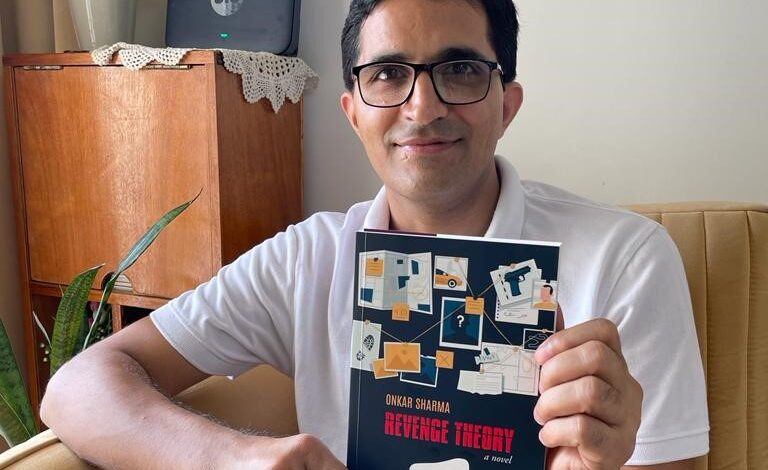‘Writing a sci-fi novel is an intriguing idea & I may consider in the future’

Journalist and author Onkar Sharma, who recently launched his second book and debut novel, Revenge Theory, grew up in a joint family in the enchanting Hamirpur district of Himachal Pradesh. This simple life in the village “imparted invaluable life lessons that continue to fortify my character to this day”.
“The joint family structure instilled in me the significance of unity, reverence for elders, the art of sharing, conflict resolution, a sense of responsibility, a deep-rooted appreciation for cultural values, empathy, adaptability, tolerance, and an unwavering reverence for our cherished family traditions,” the author said in an interview with Meghalaya Monitor.
His childhood experiences also helped him grow as a writer. “My early years were brimming with exploration – from traversing the ever-changing hues of the hills in every season to connecting with the diverse array of people in our community,” Sharma said.
In the interview, Sharma talks about his journey as an author, technology and literature and the authors and poets from the North East whom he admires. Excerpts:
MM: When did you start writing?
Onkar Sharma: My journey as a writer embarked upon its course from a tender age, as I found myself captivated by the narratives that unfolded in the stories I heard or devoured in books. I vividly recall the inception of my literary endeavours, when, at the age of eight, I began transcribing small anecdotes into the pages of my diary. As time progressed and my exposure to the realm of short stories and poetry expanded through the pages of my schoolbooks, an enduring passion for the art of storytelling and poetic expression kindled within me.
MM: You have been involved with the IT sector, both as a consultant and as a journalist, for many years. Tell us about this journey.
OS: Upon completing my postgraduate studies in my hometown, I embarked on a transformative journey to Delhi, where I took on the role of a technology journalist. This professional pivot marked a chapter of my life that both challenged and enriched my writing. I’ve been fortunate to don several hats during my career as a tech journalist. I was the editor of India’s leading IT magazine – Dataquest. Then I moved to a marketing consultant’s role in the IT industry and got the opportunity to learn several new aspects of corporate life. It was here that I discovered the profound intersection of technology and human experience, which would later infuse a philosophical dimension into my literary pursuits, inspiring me to explore the intricate connections between innovation, society, and the ever-evolving human narrative.
MM: From writing about technology to literary fiction… How was the transformation?
OS: The transition from the realm of technology writing to the realm of literary fiction marked a thrilling and liberating shift in my writing journey. While technology writing requires precision and clarity, the world of fiction grants the freedom to unleash creativity and convey profound emotions. These two contrasting dimensions harmonized seamlessly within my writing repertoire.
This transition not only broadened my horizons but also enriched my craft, enabling me to delve into diverse facets of the written word. It proved to be an immensely rewarding endeavour that beckoned me to explore the boundless possibilities of storytelling and self-expression.
MM: Your debut book was a collection of poems on suicides – Songs of Suicide. Why this subject?
OS: Songs of Suicide is an intimately personal endeavour that carries a resonance extending far beyond my own experiences. The journey that led to the creation of this poetry collection was deeply influenced by my own life’s trials and tribulations.
Considering that over 8 lakh individuals worldwide, as reported by the WHO, tragically succumb to suicide each year, I saw an opportunity to pay homage to those who have grappled with thoughts of suicide. Simultaneously, I aimed to contribute to the urgent cause of raising awareness about this critical issue. The theme of suicide delves into the very essence of the human condition, evoking profound emotions. It is a subject that calls for compassion and empathy, compelling me to explore its depths through my poetry.
Through my words, I sought to illuminate the intricate struggles individuals face and underline the pressing need for mental health awareness in our society
MM: Being into technology, would you have not thought about writing a sci-fi instead of Revenge Theory?
OS: Although I’m a great fan of sci-fi, I never felt inclined to write one. However, there are several elements of technology powering the plot of the story in Revenge Theory. It’s a literary crime fiction with a great deal of suspense that keeps readers glued to it till the last page. With Revenge Theory, I have been able to construct characters that are deeply rooted in our society and relatable. However, writing a sci-fi novel is certainly an intriguing idea, which I may consider in the future.
MM: Do you think Indian literature needs more writings based on science and technology?
OS: Our writers are on a promising path toward establishing a significant presence in the realm of science and technology-based literature. Beyond the individual efforts of writers, it is essential to garner the support of the broader ecosystem, which includes publishers and the film industry. I firmly believe that Indian literature possesses tremendous untapped potential in the field of science and technology. As our society increasingly pivots towards a technology-driven landscape, literature that delves into the ethical, societal, and personal dimensions of these advancements holds the power to be both enlightening and thought-provoking. In harnessing this potential, we can pave the way for a more nuanced and insightful exploration of the complex interplay between science, technology, and the human experience.
MM: In the foreword, Aitchison says “don’t be surprised if Bollywood snaps up this story”. Would you be interested?
OS: I would be honoured if Bollywood were interested in adapting my work into a film. The idea of seeing my characters and story come to life on the big screen is truly exciting and fulfilling as my story will reach a broader audience.
MM: How is technology changing the arena of literature, arts et al?
OS: Technology has revolutionised the world of literature and the arts by making them more accessible to a global audience. E-books, digital art platforms, and online publishing have democratized creativity, allowing artists and writers to reach a wider audience than ever before. Additionally, technology has transformed the way we consume and interact with literature and art through multimedia experiences and virtual reality.
MM: Are you aware of the literature of the North East? If yes, who are your favourite writers, poets from the region?
OS: Yes, I am familiar with the literature of the North East, which is rich in culture and diversity. Some of my favourite writers and poets from the region include Mamang Dai, Temsula Ao and Anjum Hasan, among others. Recently, I read a poetry collection on North East by Achingliu Kamei. North East is an attraction point for people in every aspect — nature, culture and literature.
MM: What will be your next writing project?
OS: Poetry and fiction continue to hold a special place in my heart, and I am committed to further honing my craft in both of these beloved genres. As for my forthcoming works, I can confidently affirm that they will maintain a dual purpose: to captivate and entertain while also shedding light on the pressing social issues that impact people’s lives.
~ Team Meghalaya Monitor




